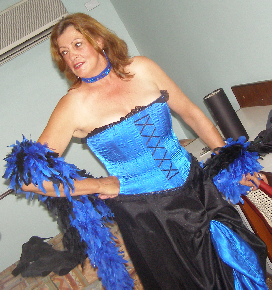Adults who loose their parents are known as adult orphans. Today there are increasing numbers of support websites aimed at adult orphans who feel the loss acutely, finding themselves ‘alone' in this world. No matter the kind of relationship one has with their parents, It is comforting knowing that there is an older, if not wiser person who has a love for us that is unconditional. Even if that relationship is inconsistent there is a certain type of solace derived from even the mere existence of parent/s. So what becomes of the adult orphan? Suddenly they are alone, without the comfort of parental existence.
My mum had an acute asthma attack, her throat closed up, she was given an emergency tracheotomy and adrenalin but she was still without oxygen for 40 minutes – she was at her boyfriend's 50th birthday in Yanchep, about an hour from
"Oxygen deprivation lasting longer than five to ten minutes can be fatal. Almost all persons surviving five minutes or more of complete oxygen depravation sustain permanent brain damage"
(BrainInjury.com, J.N. Walton, 1994).
Being without oxygen for 40 minutes meant that mum did not have severe brain damage, she was brain dead. CAT scans revealed no brain activity; she would not be waking up, ever.
Seeing your loved one with a tube down their throat forcing them to breath, their tongue pale, their mouth slack and their eyes closed, lashes covered with clear balm to maintain eye moisture, is the single most painful experience I have ever encountered. When my partner and I walked into her hospital room we collapsed into tears, shocked at the sight of my vibrant mother reduced to a saggy puddle, covered with tubes, stiches and bruises. Someone had plaited her greying hair – I left for
There were many tears, hugs and words of comfort to be had between my family, her friends and her boyfriend over the course of that Thursday. My partner and I spent much of the day by her side, saying goodbye, having accepted the inevitable that no one else really had. My brothers were still hoping and praying she would wake up. I'd been steeling myself for her death already, in
At
By
What you don't see in the movies or read in books when someone dies is their colourless lips, icy skin, their body so slack and heavy and their mouth hanging open revealing a pale lifeless tongue. I kept trying to close my mum's mouth; she would have hated the indecency of her appearance. By
"When someone's heart stops pumping blood around their body, the tissues and cells are deprived of oxygen and rapidly begin to die. The intestines are packed with millions of micro-organisms that don't die with the person. These organisms start to break down the dead cells of the intestines, while some, especially bacteria called clostridia and coliforms, start to invade other parts of the body. At the same time the body undergoes its own intrinsic breakdown under the action of enzymes and other chemicals which have been released by the dead cells. The decomposing tissues release green substances and gas which…and also gives off a terrible smell as gases such as hydrogen sulphide (rotten egg smell), methane and traces of mercaptans are released."
(Dr Trisha Macnair, BBC Health)
Over the next two weeks my partner and I took on the bulk of organizing a cremation and memorial for mum. I had no idea there were so many details to consider: funeral director, celebrant, flowers, speakers, venue, memorabilia, photographs, music, slide show, cremation, the wake and remembrance bookmarks for attendees. And that was only the beginning. There are mountains of your loved ones paperwork to sort out – bills to be paid, accounts to be cancelled or changed, companies and friends to inform of the death, assets to list and take action against, death certificates, funeral director payment and application for Pro Bate - "a judicial certificate saying that a will is genuine and conferring on the executors the power to administer the estate." (www.ask.com)
Even after the memorial service and the wake I found myself spending much time taking care of my family, mum's friends and her affairs with the assistance of her executor. Now I have returned to
I do take solace in something she used to tell me, however. "At the end of person's life, their body should be thoroughly used up and worn out, we should all arrive at the pearly gates with a glass of wine in one had, a big slice of chocolate cake in the other and a cigarette in mouth saying ‘what a ride!'"

Mum on the day she died
(13.08.1957 – 15.02.2007)
I Love you Mum.
|
|


